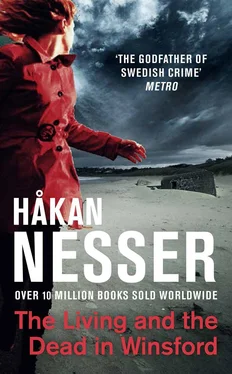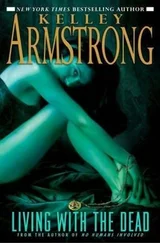Håkan Nesser - The Living and the Dead in Winsford
Здесь есть возможность читать онлайн «Håkan Nesser - The Living and the Dead in Winsford» весь текст электронной книги совершенно бесплатно (целиком полную версию без сокращений). В некоторых случаях можно слушать аудио, скачать через торрент в формате fb2 и присутствует краткое содержание. Год выпуска: 2013, Издательство: Mantle, Жанр: Криминальный детектив, на английском языке. Описание произведения, (предисловие) а так же отзывы посетителей доступны на портале библиотеки ЛибКат.
- Название:The Living and the Dead in Winsford
- Автор:
- Издательство:Mantle
- Жанр:
- Год:2013
- ISBN:нет данных
- Рейтинг книги:4 / 5. Голосов: 1
-
Избранное:Добавить в избранное
- Отзывы:
-
Ваша оценка:
- 80
- 1
- 2
- 3
- 4
- 5
The Living and the Dead in Winsford: краткое содержание, описание и аннотация
Предлагаем к чтению аннотацию, описание, краткое содержание или предисловие (зависит от того, что написал сам автор книги «The Living and the Dead in Winsford»). Если вы не нашли необходимую информацию о книге — напишите в комментариях, мы постараемся отыскать её.
The Living and the Dead in Winsford — читать онлайн бесплатно полную книгу (весь текст) целиком
Ниже представлен текст книги, разбитый по страницам. Система сохранения места последней прочитанной страницы, позволяет с удобством читать онлайн бесплатно книгу «The Living and the Dead in Winsford», без необходимости каждый раз заново искать на чём Вы остановились. Поставьте закладку, и сможете в любой момент перейти на страницу, на которой закончили чтение.
Интервал:
Закладка:
*
And while we drank tea and ate some biscuits with some black but rather tasty goo evidently called Branston Pickle, I was provided with a fair amount of information about the house I was living in — and would be living in for the best part of six months. I had the impression that despite her comparative youth, Margaret Allen knew more than most about what was what in the village. She also said that both she and her husband were active in the local folklore society, and in addition to her unpaid work at the computer centre she worked as a librarian in Dulverton.
But anyway, Darne Lodge. Well, Margaret recalled that it was built at the beginning of the nineteenth century as the residence of a certain Selwyn Byrnescotte. He was a soldier who returned home as some kind of hero after the Napoleonic wars — the Battle of Trafalgar and two other sea battles that Margaret named, but I didn’t recognize. The problem with this Selwyn was that even before he had gone to war he had been disowned by his family — or at least by his father, Lord Neville — on the Byrnescotte estate roughly midway between Winsford and Exford. The background was top secret, but probably had to do with homosexuality. In any case, the Lord had Darne Lodge built so that his decorated but wayward next-oldest son would have somewhere to live (had it been his eldest son, things would have been much more complicated) at a fairly safe distance away from the family seat. However, Selwyn didn’t like being isolated on the moor and soon moved to London, where he led a dissolute and debauched life for several years. The war was still raging, but he was unable to return to the battlefield because of some injury or other. He came back to Darne Lodge to die — it was the same year as the Battle of Waterloo — and he hanged himself from one of the roof beams. As a result of his London excesses he also had another serious injury: half his face had been shot away in a duel. Apparently he was not a pretty sight when he was eventually discovered and cut down after several months. Nobody knew that he had returned to Darne Lodge.
I suspected that Castor and I would be spending several hours with Margaret Allen — she didn’t leave out many details: but as luck would have it there was a hundred-year gap in the story. After Selwyn Byrnescotte’s tragic end, the house stood empty until about 1920 when it was bought by a Londoner who needed somewhere for himself and his household to spend the night while he was out hunting red deer on Exmoor. It was eventually taken over by his son for the same purpose, but after this unfortunate young man — his name was Ralph deBries and he seemed to be of Belgian extraction as far as one could make out — had also committed suicide there, this time with the aid of tablets, the house was sold at auction in 1958 and bought by the father of the current owner, Jeremy Tawking.
Anyway, nobody had died in the house since 1958 — Margaret Allen was careful to stress that fact — and no doubt over two hundred people had been living there as Mr Tawking had been renting it out for at least twenty years. Usually by the week during the summer months, of course, but Margaret recalled that somebody had been living there last winter as well. In any case, it seemed to be well built and insulated, and was able to withstand the winter storms.
I was able to confirm that this was the case. Even if the really hard winter storms hadn’t actually occurred yet — an assertion that Margaret agreed with. The worst usually came in January and February.
I thanked her for the tea and the information, and reaffirmed that Castor and I would be turning up again very shortly. Margaret said she suspected she had been too negative about Darne Lodge in some respects, and apologized for going on so long.
We said our goodbyes and left. The walk back up to Winsford Hill turned out to be quite difficult, with various gates, herds of bleating sheep and glaring cattle, and when we eventually came up onto the moor itself we had the wind directly against us all the way to the edge of the Punchbowl, which I could now see, looking at it from this direction, really did look like a crater. Or like the after-effects of a gigantic meteor that had crashed down several thousands of years ago and left behind a hole a hundred metres deep and roughly twice that wide.
Nevertheless, we eventually got home — both Castor and I were equally muddy and exhausted — and even as I opened the garden gate I could see that there was a dead pheasant lying outside the front door.
A magnificent male bird, lying peacefully on its side with its wings and its tail feathers in excellent shape and apparently uninjured.
Apart from the fact that it was dead.
Then Castor did something totally unexpected. He walked slowly up to the bird, sniffed at it from various angles, then carefully grasped it by the head with his teeth. Dragged it gently to one side, just a metre or so, then left it lying there next to the wall.
Then he looked at me, as if to say that it was okay to go in now.
19
In the last-but-one chat show I ever hosted, something happened that I believe was unique in the history of Swedish television.
The theme was quite serious: people who had vanished.
And how family and friends cope with a situation in which somebody has disappeared, and nobody knows what happened. Not even if the missing person is alive or dead.
We had several guests. A psychologist, a woman from the public registration office, a senior police officer who explained how the police deal with missing persons, and three people who had been affected. The latter trio comprised a couple from Västerås whose teenage daughter had been missing without trace for two years, and an elderly woman from Norrland who had reported her husband missing twenty-five years ago.
And there were two of us presenting the programme, to make sure everything went without a hitch. In other words, a normal and carefully planned set-up for twenty-eight minutes of off-peak broadcasting.
The woman from Norrland arrived quite late, just as we had planned. All the others had had their say, and the female half of the pair from Västerås had cried a little. I now turned to Alice, as the new woman was called, and asked her to tell her story. Who was the person who had disappeared from her life?
‘Ragnar, my husband,’ she said curtly.
‘And that was quite a long time ago, I believe?’ I said.
‘Twenty-five years ago,’ said Alice.
‘And what were the circumstances when he went missing?’
‘Nothing out of the ordinary. It was in the autumn, shortly before the elk-hunting began.’
‘And he disappeared from your home, is that right?’
‘Yes.’
At this point my male colleague stepped in. He had interviewed Alice on the telephone the previous day, and received a fair amount of information from her.
‘When we spoke yesterday you said that he’d gone off on his bike to fetch your newspaper from the post box: is that right?’
‘No,’ said Alice. ‘We’d already collected the paper. He was going to see if there were any letters. It was round about lunch time.’
‘And this was twenty-five years ago?’ asked my colleague.
‘Twenty-five years and one month,’ said Alice.
‘And you haven’t seen him since then?’
‘Not since that day, no.’
I intervened: ‘So he didn’t come back after going to fetch the mail.’
‘Oh yes, he came back all right,’ said Alice.
I recall that she was wearing a very elegant dress. And high-heeled shoes. Her hair was newly trimmed and dyed in a slightly unusual hue verging on gold. I think I realized that something was about to go wrong, but I couldn’t think of anything else to do other than to keep going. I saw a floor-manager holding up two fingers — so there were two minutes’ broadcasting time left.
Читать дальшеИнтервал:
Закладка:
Похожие книги на «The Living and the Dead in Winsford»
Представляем Вашему вниманию похожие книги на «The Living and the Dead in Winsford» списком для выбора. Мы отобрали схожую по названию и смыслу литературу в надежде предоставить читателям больше вариантов отыскать новые, интересные, ещё непрочитанные произведения.
Обсуждение, отзывы о книге «The Living and the Dead in Winsford» и просто собственные мнения читателей. Оставьте ваши комментарии, напишите, что Вы думаете о произведении, его смысле или главных героях. Укажите что конкретно понравилось, а что нет, и почему Вы так считаете.












